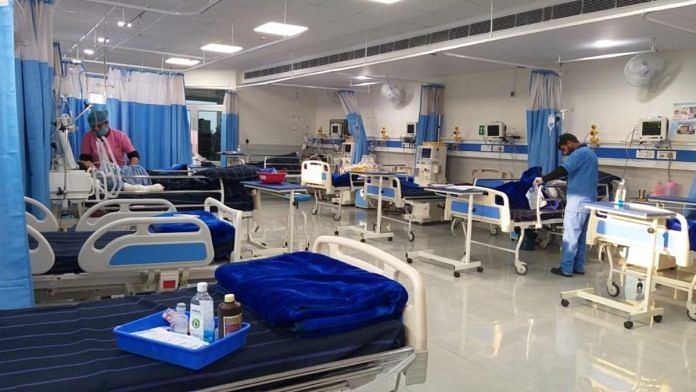New Delhi: The largest body of resident doctors has suggested that the government redefine its guidelines on minimum qualification of critical care specialists. The government should not permit doctors with just certificate courses or experience in critical care settings to work as ICU doctors, the Federation of Resident Doctors Association (FORDA) has said.
The director general of health services (DGHS) under the health ministry issued the first-ever intensive care unit (ICU) guidelines in December last year. According to the guidelines, not only specialists with specific training, certification, or ICU experience but also doctors with post-MBBS experience in critical care settings quantifiable as ICU experience of at least three years could work as ICU doctors.
FORDA, in letters to the Union health ministry, DGHS, and medical education regulator National Medical Commission (NMC) this month, said doctors who pursued recognised super-specialties and underwent comprehensive training should not be equated with those who received training for shorter durations after MBBS.
“This, we feel, is a slippery slope because we know from our experience there are thousands of set-ups that claim to be ICUs but do not have requisite infrastructure or facilities,” FORDA president Dr Aviral Mathur told ThePrint.
“When the ICU setting itself is not appropriate or inadequate, how can doctors who work in such settings pass on as intensivists (critical care specialists) after an experience of a few years?” Mathur asked.
ThePrint has a copy of FORDA’s letter.
“In the era of the National Entrance cum Eligibility Test-Super Speciality (NEET-SS), where a rigorous six-year course duration is typically required to attain super-specialisation in India, we urge the NMC and the health ministry to consider the potential impact on the opportunities for candidates pursuing six years of courses to become proper super-specialists,” the letter said.
A panel of critical care specialists from government and private hospitals across India has prepared the ICU guidelines. Senior critical care specialist Dr Raj K. Mani, who was part of the panel, dismissed the concerns expressed by the FORDA, saying it is the first time that the criteria for an ICU doctor have been defined in the country.
“There are many hospitals where Ayush or traditional medicine doctors man ICUs due to acute shortage of critical care specialists,” he told ThePrint. “In the absence of qualified ICU doctors, I do not see a problem with MBBS doctors, who have experience in critical care settings, working in ICUs,” he said.
Some doctors, he added, might be overlooking the ground realities or over-interpreting the ICU guidelines.
The FORDA letter came weeks after the Medico-Legal Society of India, a group of doctors who aid others from the fraternity when they face medico-legal cases in the country, asked the government to retract the ICU guidelines.
The Medico-Legal Society of India said the guidelines would further reduce the trust between patients and doctors. It was criticising a guideline that says critically ill patients should not be admitted to ICUs if they or their next of kin refuse the intensive treatment or if they have any diseases with a treatment limitation plan indicating ICU interventions would not be beneficial. The guideline implied that patients are admitted into ICUs unnecessarily, the society argued in a letter to the Prime Minister’s Office (PMO). ThePrint has seen the letter.
ThePrint made multiple calls to health secretary Apurva Chandra to check if the government is reviewing the guidelines but did not receive any response. This report will be updated if and when a response is received.
Also read: Intensive care only if it can improve patient’s condition — what India’s 1st ICU admission norms say
‘Follow NMC, international standards’
In a meeting with NMC representatives last week, FORDA proposed closely aligning the criteria for critical care specialists with the standards set by the commission and other international bodies.
Recognition as a super-specialist should be reserved for individuals with recognised postgraduate super-specialty qualifications like Doctor of Medicine, Diplomate of National Board, Fellowship of National Board, or equivalent qualifications from recognised institutions.
“This approach ensures a uniform and high standard of expertise among super specialists, safeguarding the quality of medical services in the country,” the federation said.
The federation said it understood the importance of experience in the field and appreciated courses offering additional training, but it still urged a re-evaluation of the criteria. “…maintain a balance that upholds the integrity of super-specialisation while recognising valuable experience,” it said.
A senior NMC official who did not wish to be named said the NMC had no role in issuing the ICU guidelines but should have been consulted before the criteria was finalised.
“Now, if the ministry decides to review the guidelines and asks for our input, we will recommend that doctors who passed NMC-approved courses in critical care medicine should be permitted to work in ICU settings,” he said.
(Edited by Madhurita Goswami)
Also read: Health ministry asks NMC to defer minimum standards for medical colleges — ‘unrealistic’



